The theater critique can maximize the encounter between the viewer and the creative work: clues, keys, holes, connections. Therefore, MITsp offers a number of activities that seek to improve the perception of the audience, through a critical and provocative perspective.
Curators: Fernando Mencarelli e Silvia Fernandes
Organization, research and texts: Julia Guimarães
Crossing Dialogues
Shortly after each show’s first performance, artists and thinkers, from different fields of knowledge present their reviews. The idea is to allow perspectives to go beyond borders and expand possible interpretations of the works, thus renewing the critique activity itself.
- Alejandro Ahmed – Hamlet, by Oskaras Koršunovas
- Felipe Hirsch – “We Are Like Those Toads…” + “Ali”, of MPTA
- Frei Betto – “Escuela (School)”, of Guillermo Calderón
- Ismail Xavier – “Cineastas (Filmmakers)”, of Mariano Pensotti
- Laymert Garcia dos Santos – “On the Concept of the Face, Regarding the Son of God”, of Romeo Castellucci
- Lisette Lagnado -“Anti-Prometheus, of Sahika Tekand
- Pedro Cesarino -“Suddenly Everywhere is Black With People (De repente fica tudo preto de gente)”, of Marcelo Evelin Company
- Peter Pal Pélbart -“Gólgota Picnic”, of Rodrigo García
- Suely Rolnik -“Yo No Soy Bonita (I Am Not Pretty)”, of Angelica Liddel
- Tales Ab’Sáber -“Bien Venido a Casa (Welcome Home)”, of Roberto Suárez
- Vladimir Safatle -“Ubu and the Truth Commission”, of William Kentridge and Handspring Puppet
Mediator: Beth Néspoli
*Crossing Dialogues activities are open to the general public, and not only to who attended the shows, as long as there are sits available.
Pathways in Perspective
Researchers of Brazilian Universities introduce us to the creative trajectories of the MITsp guest artists, exploring ways to interpret the shows presented at the Festival. Other videos of the shows are available at the Itaú Cultural Library during the Festival period. This section is a result of the wish to establish a dialogue with the performing arts postgraduate programs of the country.
| Andre Carreira (State University of Santa Catarina – Udesc) |
Roberto Suárez |
| Clovis Massa (Federal University of Rio Grande do Sul – UFRGS) |
Sahika Tekand |
| Fernando Villar (University of Brasília – UnB) |
Mariano Pensotti |
| Helena Katz (Pontifical Catholic University of São Paulo – PUC-SP) |
MPTA |
| José Da Costa (State Federal University of Rio de Janeiro- Unirio) |
William Kentridge |
| Lúcia Romano (State University Paulista – Unesp) |
Simon McBurney |
| Luiz Fernando Ramos (University of São Paulo – USP) |
Romeo Castellucci |
| Narciso Telles (Federal University of Uberlândia – UFU) |
Guillermo Calderón |
| Nina Caetano (Federal University of Ouro Preto – UFOP) |
Marcelo Evelin |
| Renato Ferracini (State University of Campinas – Unicamp) |
Oskaras Koršunovas |
| Sara Rojo (Federal University of Minas Gerais – UFMG) |
Angélica Liddel |
| Stephan Baumgartel (State University of Santa Catarina – Udesc) |
Rodrigo García |
*The Pathways in Perspective activities take place at the Itaú Cultural and the entrance tickets will be handed to the public 30 minutes before the start.
Essays Space
Researchers are invited to write about the Festival guest artists, their raw materials and creative processes. Their texts are compiled in the MITsp book-program.
Ongoing Thought
The Festival guest artists are invited to talk about their creative process, exposing the internal textures and structures of their artwork. Cecília Almeida Salles, expert in creative processes, will conduct the talks.
Confirmed Artists:
- Angelica Liddell and Gumersindo Puche (Atra Bílis Theater/ “I Am Not Pretty”)
- “Romeo Castelucci (video conference) and Gianni Plazi and Sergio Scarlatella (Socìetas Raffaello Sanzio/ “On the Concept of the Face, Regarding the Son of God”)
- Guillermo Calderón (video conference) and Camila González, Carlos Ugarte, Francisca Lewin, Luis Cerda, Maria Paz Gonzales and Trinidad González (“Escuela”)
- Janny Young and Adrian Kohler (Handspring Puppet Company/ “Ubu and the Truth Comission”)
- Marcelo Evelin (Demolition Inc./ “Suddenly Everything is Black With People”)
- Mariano Pensotti (Marea/ “Filmmakers”)
- Mathurin Bolze and Hédi Thabet (MPTA/ “We Are Like Those Toads” + “Ali”)
- Oskaras Koršunovas, Darius Meskauskas, Dainius Gavenonis and Rasa Samuolyte (OKT/ “Hamlet”)
- Roberto Suárez (Pequeño Teatro de Morondanga/ “Bienvenido a Casa”)
- Rodrigo García and John Romao (Carnicería Teatro/ “Gólgota Picnic”)
- Simon McBurney (Complicite)
*The Ongoing Thought activities take place at the Itaú Cultural and the entrance tickets will be handed to the public 30 minutes before the start.
Practice of Reviewing
The Collective of Critics is a temporary gathering of theater critics, with an active presence on the internet. It is composed by the blog Satisfeita, Yolanda? (PE), the websites Horizonte da Cena (MG) and Teatrojornal (SP), and the electronic journal Questão de Crítica (RJ); throughout the festival period, they will write and deliver reviews on the shows, for electronic and printed press, which will be distributed in the venues one day after the premiere.
- Antro Positivo (São Paulo/SP)
Ruy Filho
Ana Carolina Marinho
http://www.antropositivo.com.br
- Horizonte da Cena (Belo Horizonte/MG)
Soraya Belusi
Luciana Romagnolli
http://horizontedacena.blogspot.com.br
- Questão de Crítica (Rio de Janeiro/RJ)
Daniele Avila Small
http://www.questaodecritica.com.br
- Satisfeita, Yolanda? (Recife/PE)
Pollyanna Diniz
Ivana Moura
http://www.satisfeitayolanda.com.br
- Teatrojornal (São Paulo/SP)
Valmir Santos
Maria Eugênia de Menezes
http://teatrojornal.com.br
Meta-critique
In addition to writing reviews, the Collective of Critics works on a way to question their own place and internally and publicly destabilize issues such as authorship, truth and point of view. For this, they developed two fold: a meta-critique exercise and, from it, the creation of collective texts. Those texts will be the starting point. Other critics will later comment and from the observations brought by them, each one can reevaluate their ideas and conclusions, thus creating a web of arguments and thoughts.
Posted on social networks, these reviews seek to influence and be influenced by someone else’s writing, and together at the end, they create a network of critic thinking, a polyphonic writing, without hierarchy and, therefore, multifocal. A shared creation in process, which is unable, by nature, to establish itself as a univocal speech. At the end of this exercise on the Internet, the critics who wrote the first texts shall rewrite them, considering all the raised questions.
Critique on the Criticism
Scholars and critics talk about the challenges of producing theater critics today.
A roundtable composed by Kil Abreu, Luiz Fernando Ramos, Edelcio Mostaço + Collective of Critics, with mediation of Fernando Mencarelli.
Critical thinking on the contemporary scene has developed in the last decades, but has been restricted to specialized circuits. However, the criticism directed at the viewer seems to constantly reinvent itself, driven by the lack of interest and space devoted to it in the traditional media. Where does this contradiction come from? Does the theater participate less and less on the great national debates for having less power of impact, and so becoming the object of experts? Do recent changes in the medias make it impossible for critical thinking to consolidate, leveling down the art and favoring its massive forms? Will newspaper theater reviews end? Are the Internet and its possibility to reach viewers directly the future of theater critique? Do collective, polyphonic, collaborative forms contribute to reestablish the dialogue with artists and their works to offer the viewer a critique repertoire in times of shared workmanship?
March 15th, from 10h to 13h
Location: Itaú Cultural*
* Entrance tickets will be handed to the public 30 minutes before the start.
Short Biographies
Crossing Dialogues
Alejandro Ahmed: He is choreographer, artistic director and dancer of Grupo Cena 11 Dance Company. With Cena 11, he developed a technique that aims to create a dance from the body. Also with the group, he directed the shows “Violência (Violence)”, “Skinnerbox”, ” Pequenas frestas de ficção sobre realidade insistente (Small fiction gaps about insistent reality)” and the recent “Sobre expectativas e promessas (On expectations and promises)”, all of them have been awarded. He specialized with professors such as Ismael Guiser, Ivonice Satie, Yoko Okada, Roseli Rodrigues, Sasha Waltz and Bert Gztettner.
Felipe Hirsch: He is director, playwright, set designer, producer. Founder, with Guilherme Weber, of the Sutil Theater Company (1993), which collects more than 100 awards and nominations in its fifteen years of existence. He created and directed, among others, the shows “Avenida Dropsie (Dropsie Avenue)” – 4 nominations for the Shell Award, “Temporada de Gripe (The Flu Season)” – George Oppenheimer Award 2004 NYC; “A Morte de um Caixeiro Viajante (Death of a Salesman)” – APCA Award for Best Show 2003; “A Vida é Cheia de Som & Fúria (Life is Full of Sound & Fury)” – Shell Award for Best Direction 2000. His most recent work is “Puzzle”, which premiered at the Frankfurt Book Fair in 2013 and competes for the APCA Special Prize.
Frei Betto: He was born in Belo Horizonte (Minas Gerais) and studied journalism, anthropology, philosophy and theology. Dominican friar and writer, he won, in 1982, the Jabuti Prize, granted by the Brazilian Book Chamber, for his memoir “Batismo de Sangue (Baptism of Blood)”. In 1986, he was elected Intellectual of the Year by the Brazilian Union of Writers, with the Juca Pato Award for his work “Fidel e a religião (Fidel and religion)”. He was also awarded for the books “A noite em que Jesus nasceu (The Night Jesus was born)”, for best children’s and youth book by the Paulista Association of Art Critics; and “Típicos Tipos – perfis literários (Typical Types – Literary Profiles)” in the Chronicles and Tales category by the Brazilian Book Chamber. In 2003 and 2004, he worked as a Special Advisor for President Lula and also as Social Mobilization coordinator of the Fome Zero Program. Since 2007, he is a member of the Justice and Peace Advisory Board Commission of São Paulo. He is a founding partner of the “Education for All” Program.
Ismail Xavier: He teaches at ECA-USP and was a Visiting Professor at New York University (1995), University of Lowa (1998), Université Paris III – Sorbonne Nouvelle (1999, 2011), University of Leeds (2007) and University of Chicago (2008); He published, among other books, ” O Discurso Cinematográfico: a opacidade e a transparência (The Cinema Speech: the opacity and the transparency)” (Paz e Terra, 1977), ” Sertão Mar: Glauber Rocha e a estética da fome (Hinterland Sea: Glauber Rocha and the aesthetics of hunger” (Brasiliense, 1883, Cosac Naify 2007), “Alegorias do subdesenvolvimento: Cinema Novo, Tropicalismo, Cinema Marginal (Allegories of Underdevelopment: New Cinema, Tropicalism, Marginal Cinema) “(Brasiliense 1993, Cosac Naify 2012), “O olhar e a cena: melodrama, Hollywood, Cinema Novo, Nelson Rodrigues (The vision and the scene: melodrama, Hollywood, New Cinema, Nelson Rodrigues)” (Cosac Naify, 2003).
Laymert Garcia dos Santos: Full Professor (retired) of Unicamp. Together with Peter Ruzicka and Peter Weibel, he was artistic director of the multimedia opera show “Amazonas”, presented at the International Festival for New Music Theater in Munich, 2010. He was co-director of the film “Xapiri”, about the Yanomami shamanism, author of several books, the last of them “Amazônia Transcultural – xamanismo e tecnociência na ópera (Transcultural Amazon – shamanism and technoscience in opera)”, by the publishing house n-1. He writes regularly about the relations between technology and culture, and about contemporary art, having published his essays on books, catalogs and magazines of Brazil and abroad.
Lisette Lagnado: Lisette Lagnado (1961, Kinshasa – Congo) lives in São Paulo (Brazil) where she acts as critic and curator. She teaches at Escola São Paulo. She co-coordinated the Post-graduation in Curatorial Practices and Cultural Management of Santa Marcelina College (2007-2012). In the 1980s, she was editor of the magazine Arte em São Paulo e Galeria. She was curator of the 27th São Paulo Biennial (2006), in the exhibition “Desvíos de la deriva” (Museo Nacional Centro de Arte Reina Sofía, Madrid, 2010) and in the 33rd Panorama of the Museum of Modern Art of São Paulo (2013).
Pedro Cesarino: He is professor of the Anthropology Department at USP. Specialized in ethnology, translation studies and anthropology of art, he published the books “Oniska – poética do xamanismo na Amazônia (Oniska – poetics of shamanism in the Amazon)” (Perspectiva, 2011) and “Quando a Terra deixou de falar – cantos da mitologia marubo (When the Earth ceased to speak – chants of Marubian mythology)” (Ed. 34, 2013), besides other articles and literary texts. In the theater, he worked with Cia. Livre as a researcher and playwright between 2006 and 2012.
Peter Pal Pélbart: He is professor of Philosophy at PUC-SP. His writing subjects are mainly: madness, time and subjectivity and bio-politics. He published, among others, “O Tempo não-reconciliado (The Unreconciled Time)” (Ed. Perspectiva), “Vida Capital (Capital Life)” (Ed. Iluminuras) and more recently, “O avesso do niilismo: cartografias do esgotamento (The reverse of nihilism: cartographies of exhaustion)” (Ed. n-1 editions). He translated several works of Gilles Deleuze. He is a member of Cia Teatral Ueinzz, and co-editor of the n-1 editions.
Suely Rolnik: She is psychoanalyst, art and culture critic and curator, she is a full professor of PUC-SP (Post-Graduation in Clinical Psychology) and a member of the Independent Studies Program (PEI) at the Museu d’Art Contemporani de Barcelona (MacBa). She made the project Arquivo para uma Obra-Acontecimento (Archive for an Piece-Happening), of 65 films in which she seeks to make tangible the poetic of Lygia Clark (chosen by the Art Forum as top 10 art projects of 2011 and winner of the Brazilian Graphic Design Biennial award of 2013). Among her books are: “Archivmanie / Archive Mania” (dOCUMENTA 13, 2011), “Anthropophagie Zombie” (Paris, 2012), and, in co-authorship with Felix Guattari, “Micropolítica. Cartografias do desejo (Micropolitics: Cartography of Desire)” (São Paulo, 1986; 11th ed. 2011), published in seven countries. Author of more than 200 essays published in several languages, she works as clinical psychologist in her private practice.
Tales Ab’Sáber: He graduated in Cinema and did his masters in Arts at ECA / USP. Psychologist by the Institute of Psychology of USP, and PhD on contemporary psychoanalytic practice, also by the University of São Paulo. He is a Member of the Sedes Sapientiae Institute Psychoanalysis Department and a professor of Psychoanalysis Philosophy at the Philosophy Course of UNIFESP. He is an essayist interested in the imbrication between psychoanalysis and culture, he has published works on specialized magazines and also in the mainstream press. In 2005, he received the Jabuti Prize for the book “O Sonhar Restaurado – Formas do Sonhar em Bion, Winnicott e Freud (The Restored Dream – Forms of Dreaming in Bion, Winnicott and Freud)” (Ed. 34). In 2012, he published “A Música do Tempo Infinito (The Music of Infinite Time)”, about techno culture and contemporary subjectivation (Cosac Naify).
Vladimir Safatle: He is full professor of the philosophy department at USP. He holds a degree in Philosophy and Social Communication, a Masters in Philosophy from USP (1997) and a PhD from the Université de Paris VIII (2002). He was a visiting professor of the Universities of Paris VII, Paris VIII, Toulouse and Louvain. He does research in the areas of: epistemology of psychoanalysis and psychology; unfolding of the Hegelian dialectical tradition in the 20th century philosophy; and philosophy of music. He is one of the coordinators of the International Society of Psychoanalysis and Philosophy.
Pathways in Perspective
André Carreira (UDESC): Professor of the State University of Santa Catarina (Udesc), in the Department of Performing Arts and in the Theater Graduate Program (Master’s – Doctorate). He has a degree in Visual Arts from UnB and a PhD from the University of Buenos Aires (1994). He is director of the groups Experiência Subterrânea (Florianópolis) and Teatro Que Roda (Goiânia) with whom he develops proposals that involve physical and emotional risk in the process of acting, and exploration of urban spaces. He is the author of the book “Teatro de Rua: uma paixão no asfalto (Street Theater: a passion on the pavement)” (Hucitec). Carreira is a CNPq researcher since 1997 and coordinates the Research Center on Processes of Artistic Creation (ÁQIS-UDESC) with a project on “Acting from out States”.
Clóvis Massa (UFRGS): He is professor of the Postgraduate Program in Performing Arts at UFRGS in the fields of theatricality, poetics and theatrical aesthetics. Adjunct Professor IV of the Performing Arts Department of the Institute of Arts of UFRGS in the areas of History of the Spectacle, Drama and Theater Theory. PhD in Literature Theory by PUC-RS, with the thesis Aesthetics and Theory of Reception, with PhD training at the Université Paris 8 Vincennes-Saint Denis. Master’s degree from ECA / USP.
Fernando Villar (UnB): Author, director and teacher. Founder of the groups Vidas Erradas (1983-89); Teatro Universitário Candango (TUCAN, 1992-2004) and CHIA, LIIAA! (2007). He graduated in Fine Arts from UnB in 1983, he has a postgraduate degree in theater direction from Drama Studio London in 1991 and PhD in theater and performance from Queen Mary College, University of London, 2001. He is a professor of the Department of Performing Arts at the University of Brasília (UnB) since 1993.
Helena Katz (PUC-SP): She is professor in the programs: Arts of the Body Communication; and Communication and Semiotics at PUC-SP, where she did her doctorate (1994) with the thesis “Um, Dois, Três. A Dança é o Pensamento do Corpo (One, Two, Three. The Dance is the Body’s Thought) “, published in 2005. She is dance critic since 1977. She graduated in Philosophy from the Faculty of Philosophy and Education of UERJ (1971) and coordinates the Center for Studies of Dance (CED), a CNPq certified research group. In 2010, she also became a professor at the Dance School of the Federal University of Bahia (UFBA). She develops, together with Doctor Professor Christine Greiner, the Body Media Theory, currently on a new stage with the research project The new Statute of the body in Post-Ideological Societies. She is a member of the Research Group DC3-Dance, Science, Communication and Culture, led by Doctor Professor Clélia Ferraz Pereira de Queiroz.
José Da Costa (UNIRIO): Professor of the Theater History program and researcher at UNIRIO since 1992, he is also a researcher at CNPq. PhD in Comparative Literature by UERJ (2003) and Master of Theater by UNIRIO (1997), institution of which he has been Vice-Rector since 2011. His main areas of research are linked to contemporary dramaturgy, intertextuality and Brazilian theater of the present, especially with regard to the modes of subjectivation promoted by theater and the political content of the current theater scene. He published the book “Teatro Contemporâneo no Brasil: criações partilhadas e presença diferida (Contemporary Theater in Brazil: Shared Creations and Deferred Presence)”.
Lucia Romano (Unesp): Founder actress of the groups Barca de Dionisos and Teatro da Vertigem, she is currently an interpreter and producer in the theater companies: Cia. Livre de Teatro and Mundana. She collaborated with Cia 8 Nova Dança, in the show “Xapirí Xapiripê”. Bachelor in Theater Theory by USP Communications and Arts School (1991), Master in Communication and Semiotics from Pontifícia Universidade Católica de São Paulo (PUC) and PhD from ECA-USP, she has experience in the areas of Performing Arts and Dance, with emphasis on theater acting, corporeality, genre and creative processes. She is also a professor in the Institute of Arts at the Paulista State University Júlio de Mesquita Filho (Unesp).
Luiz Fernando Ramos (USP): Associate Professor of the Performing Arts Department of USP, he teaches Theater History and Theory since 1998. He is a researcher at CNPq and he coordinates the GIDE – Spectacle’s Performance Research Group. He was a theater critic for the Folha de S. Paulo newspaper between 2008 and 2013 and he works as a playwright, director and documentary filmmaker.
Narciso Telles (UFU): He is an actor and a professor in the Theater Course and in the Postgraduate Program in Arts of the Federal University of Uberlândia (UFU), researcher of CNPq, FAPEMIG and GEAC / UFU and member of the Teatro da Marge group.
Nina Caetano (UFOP): She is a researcher of contemporary theater, performer and playwright. As a playwright, she works with several theater groups in Belo Horizonte, either directing or producing the plays. PhD in performing arts from ECA / USP, she is a professor at the Department of Performing Arts at UFOP, where she coordinates the NINFEIAS – Feminist Research Group. Since 2007, she has been a member of Obscena – an independent grouping of scenic research -, in which she investigates the text qualities produced in the heat of the performative action: performed writings.
Renato Ferracini (Unicamp): He is an Actor, researcher and coordinator of LUME – Interdisciplinary Nucleus of Theater Research – at Unicamp. He also works as full professor and as a Master’s and Ph.D research supervisor for the Post-Graduate Arts Program at the Instituto de Artes – UNICAMP. He has four books published, being the most recent “Ensaios de Atuação (Acting Essays)” (2013). He performs in five shows of LUME’s repertoire, most recently on the “Os bem-intencionados (The well-intentioned ones)” of 2012, having received the Shell Award of 2013 in the special category for LUME’s 25 years of Continuing Research.
Sara Rojo (UFMG): Associate Professor at UFMG, she has experience in the areas of Arts, with emphasis in Critique, Theory and Theater Direction, working mainly in the following subjects: Latin America and Latin American Theater and Performance. Her last published books are “La pulsíón anárquica en el teatro latinoamericano: estudios teatrales en Brasil, Chile y Argentina (The anarchic drive in Latin American theater: theater studies in Brazil, Chile and Argentina)” and “Por uma crítica política da literatura: três perspectivas latino-americanas (For a political critique of literature: three Latin American perspectives”, co-authored by G. Ravetti and G. Rojo. She is the founder of Mayombe Theater Group, with whom she directed her latest show: “Klásico (com K) (Klassic (with K))”.
Stephan Baumgärtel (UDESC): He is assistant Professor of UDESC in the areas of theater history, theater aesthetics and dramaturgy. He has a Master’s degree by the Ludwig-Maximilians-Universität München (1995), a PhD in English Language Literature by UFSC (2005), and a postdoctoral degree by ECA / USP (2009-2010) with studies on contemporary Brazilian dramaturgy. His PhD thesis received the 2005 CAPES Award. As a guest lecturer, he taught postgraduate classes at USP and UNICAMP.
Critics Collective
Ana Carolina Marinho: born in Natal / RN, she lives in São Paulo since 2011. Graduated in Acting by SP Theater School, she is a member of the Estopô Balaio Collective. In 2013 she began working for the Antropositivo magazine, covering the International Performing Arts Festival of Salvador and the Satyrianas Festival 2013, she also collaborates in other sections of the Magazine. She participated in the Galpão Short Scenes Festival, in the Satyrianas, and the August Theater. In 2011, she joined the Research Centre of Grupo XIX de Teatro and attended the course of Realism Forms and Origin of the Performance in the Contemporary Theare conducted by Kil Abreu. In Natal she integrated several workshops along with the Clowns Group of Shakespeare.
Daniele Avila Small: she is a researcher, translator and theater critic. Master in Social History of Culture by PUC-Rio, she graduated in Theory of Theater at UNIRIO. She was the artistic director of the Teatro Gláucio Gill in 2011 and 2012 during the Double Complex Occupation, for which she was nominated for the Shell Award and for the APTR Award, both in the special category. In 2008, she created the Questão de Crítica (Critic Issue) – an electronic magazine of critics and theater studies, of which she is the editor.
Ivana Moura: Journalist and cultural producer. Blogger of Satisfeita, Yolanda? since November / 2010. She specialized in Journalism and Cultural Critique (UFPE). Master’s Degree in Literature Theory (Language Studies -UFPE). She worked as reporter, assistant editor and publisher of the Caderno de Cultura (Viver) of the Pernambuco Journal (1989-2013). She wrote the book “Osman Lins, o matemático da prosa (Osman Lins, the mathematician of prose)”. Author of the play “O Crepúsculo de Van Gogh (Van Gogh’s Twilight)”. Organizer of the event “Para amar Clarice (To love Clarice)” (Recife, 2007). Curator of the photographic exhibition “O Recife de Clarice (Clarice’s Recife)”. She adapted and directed (along with Lúcia Machado) the show “Os desastres de Sofia (Sofia’s Disasters)”, inspired in the tale of Clarice Lispector.
Luciana Romagnolli: she is a journalist, theater critic and cultural producer. Graduated in Social Communication by UFPR, specialist in Theatrical Literature and Theater at UTFPR and master in Arts – Theater at UFMG. She worked as a culture reporter in the newspapers Gazeta do Povo (PR) and O Tempo (MG); and as a guest critic in several Brazilian festivals. She is a theater critic and coordinator of the Janela de Dramaturgia project in Belo Horizonte. She also coordinated the production of the 15th International Short Film Festival of Belo Horizonte. She is co-founder and editor of Horizonte da Cena blog.
Maria Eugênia de Menezes: she is a reporter and theater critic of Caderno 2 section of the newspaper O Estado de S.Paulo, and co-editor of the website Teatrojornal. Graduated in journalism from USP, with a master’s degree in Literary Theory and Comparative Literature by the same university. She worked at the Cultural Center of São Paulo and at the São Paulo City Department of Culture as correspondence coordinator. As a journalist, she worked at Folha de S.Paulo between 2007 and 2010, also writing about performing arts.
Pollyanna Diniz: journalist, theater critic and cultural producer. She idealized, together with Ivana Moura, the blog Satisfeita, Yolanda?, created three years ago, a blog specialized in reviews and performing arts news. She is a collaborator for the Continente magazine. She has been invited to work as a critic in several festivals, such as Janeiro de Grandes Espetáculos, Palco Giratório Recife and Mostra Capiba de Teatro. As a journalist, she worked for the Diário de Pernambuco newspaper, Rede Globo Nordeste and TV Universitária.
Ruy Filho: Bachelor in Visual Arts, director and playwright. He founded in 2008 the Theater Company Antro Exposto and the critique collective Dialogues. He is the editor of the digital magazine Antro Positivo, about theater and cultural politics. He is the manager of theater and performance at Centro Cultural Rio Verde. Curator of the Parallel Programming and guest playwright in the Puzzle Project, directed by Felipe Hirsch and presented at the Fair of Frankfurt and Sesc SP. He was assistant director of Gerald Thomas, from 1999 to 2008. He was a guest speaker in the Directing and Dramaturgy courses of Theather School of São Paulo and at the Advanced Drama Center at SESI Curitiba. He recently joined the award committee of Votorantim Prize for Cultural Democratization, São Paulo State Governor for Culture Award and PROAC Theatrical Production and Circulation Prize.
Soraya Belusi: she is a journalist, critic and theater researcher. Master in Arts at UFMG, she graduated in Journalism from the University Center of Belo Horizonte, and she is an actress graduated from the UFMG University Theater. She worked for eight years as a performing arts specialized reporter for the newspaper O Tempo (BH) and she collaborates with several communication means throughout the country, with articles published in the State of Minas Gerais Journal, Folha de S.Paulo, Bravo!, Sala Preta, among others. She is co-founder and editor of Horizonte da Cena blog.
Valmir Santos: Journalist, researcher and theater critic since 1992. Coordinator of the website Teatrojornal – Theater Readings. He is a collaborator of Valor Econômico Newspaper and has worked for the Folha de S.Paulo newspaper (1998-2008). Master’s degree in performing arts by USP (2009). He is a member of the Shell Award of Theater committee in São Paulo (2003-2011) and curator of the Recife National Theater Festival (2011). Consultant of the International Theater Festival Palco & Rua of Belo Horizonte (2012) and a member of the Rumos Itaú Cultural Program committee (2013/2014).
Critique over Critics
Edelcio Mostaço: He is theorist, critic, essayist and dramaturgist. He is an associate professor at the State University of Santa Catarina (UDESC), working in graduate, postgraduate and post-doctoral supervision. He holds a degree in Theater Direction and Theater Criticism (1974) and a PhD in Arts-Theater (2002), both by USP. He was a theater critic of Folha de S.Paulo newspaper. He has been a visiting professor in the Graduate Program of Performing Arts at UFRGS and at USP. Author of the book ” Teatro e Política: Arena, Oficina e Opinião (Theater and Politics: Arena, Workshop and Opinion)”.
Kil Abreu: He is journalist, critic and theater researcher, postgraduate in Arts by USP. He worked as critic for the Folha de S.Paulo newspaper and Bravo magazine! He directed the Theater Department of São Paulo’s City Department of Culture (2003/2004), where he managed some of the city’s main programs for art, such as Audience Development and the Municipal Program for Theater Promotion. He was curator in the festivals of Curitiba, Recife and in the International Theater Festival of São José do Rio Preto. For ten years, he was professor and pedagogical coordinator of the Free Theater School of Santo André and for eight years Abreu was part of the committee of the Shell Award São Paulo. He is a member of the Paulista Association of Art Critics (APCA) and curator at Centro Cultural São Paulo (São Paulo Cultural Centre). He studies dramaturgy and contemporary Brazilian theater.
Luiz Fernando Ramos: check the list on the Pathways in Perspective category.
Mediators
Beth Néspoli: She is a journalist and Phd student in Performing Arts at ECA-USP and one of the collaborating critics of the website Teatrojornal (www.teatrojornal.com.br). For 15 years, between 1995 and 2010, she wrote in Caderno 2, the Cultural Supplement of the newspaper O Estado de S. Paulo, acting as a reporter specialized in theater and, as of 2003, also as a theater critic. She has covered several editions of international theater festivals in cities such as Porto Alegre, Recife, Londrina, S. José do Rio Preto and Belo Horizonte. She was on the committee of the Shell Award and of the Paulista Association of Art Critics Award (APCA). Néspoli had articles published in the Sala Preta journal of ECA-USP; in the book Próximo Ato: Teatro de Grupo (Next Act: Group Theater); and in the Cult Magazine.
Cecília de Almeida Salles: She is a full professor of the Post-Graduation Program in Communication and Semiotics at PUC-SP. Coordinator of the Research Group on Creative Processes. She was curator of the event Redes da Criação (Networks of Creation) at Itaú Cultural in 2008. Author of the books “Gesto inacabado (Unfinished Gesture)” (1998), “Crítica Genética (Genetic Criticism)” (2008), “Redes da Criação (Networks of Creation)” (2006) and “Arquivos de Criação: arte e curadoria (Creative Archives: art and curatorship)” (2010). She directs the publishing house and cultural space “Intermeios”: house of arts and books in São Paulo / Brazil.
Fernando Mencarelli: He is a full professor of UFMG, a CNPq researcher and a theater director. Post-Doctorate at the Theater University Sorbonne Nouvelle / Paris III. He is a Professor on the Fine Arts department at UFMG on the undergraduate degree in Theater and postgraduate in Arts. Mencarelli is a member of the Advisory Committee of CNPq in the area of Arts. He was President of ABRACE (Brazilian Association of Research and Post-graduation in Performing Arts) and is an associate artistic director of the International Theater Center Ecum (CIT-Ecum).
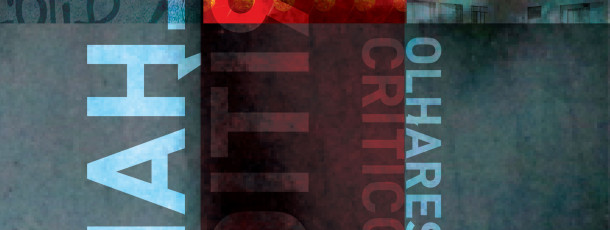
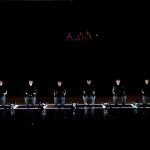
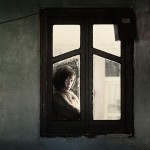
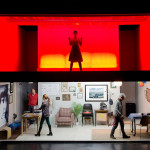
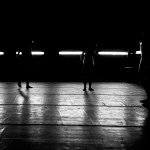
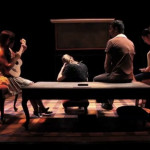

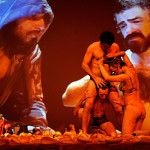
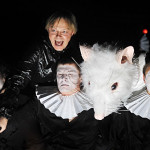

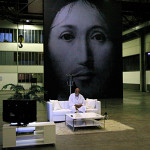
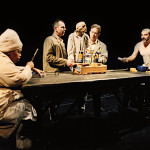
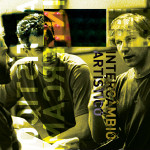
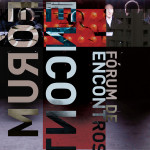

Compartilhar: